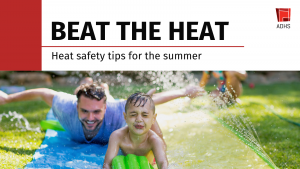 It’s not uncommon for long-time Arizonans to brush off our summer heat as just a fact of life in our state. However, extreme heat like the temperatures forecasted statewide this weekend can be deadly serious: 552 people in Arizona died from heat-related effects in 2021, and another 2,873 visited an emergency room for treatment.
It’s not uncommon for long-time Arizonans to brush off our summer heat as just a fact of life in our state. However, extreme heat like the temperatures forecasted statewide this weekend can be deadly serious: 552 people in Arizona died from heat-related effects in 2021, and another 2,873 visited an emergency room for treatment.
In most cases, heat-related illness is preventable if you follow a few simple rules that can save your life:
- Drink water: Even people who stay mostly indoors all day should drink at least 2 liters of water per day. Going outside? Drink 1 to 2 liters during each hour you are outdoors. Be very careful during strenuous activity outdoors because your body can lose up to a gallon of water per hour. Carry water with you and drink even if you do not feel thirsty.
- Dress for the heat: Wear lightweight, light-colored clothing. Light colors will reflect some of the sun’s energy. It is also a good idea to wear a hat or use an umbrella. Use and regularly reapply sunscreen.
- Eat small meals and eat more often: Avoid foods that are high in protein. These increase metabolic heat.
- Monitor those at high risk: Check on friends, family, and neighbors for signs of heat exhaustion or heat stroke. Pay special attention to the elderly and the very young.
- Slow down: If you must do strenuous activity, do it during the coolest part of the day, which is usually between 4 a.m. and 7 a.m. But keep in mind that cooler times also will have mosquitoes, to be sure to protect yourself.
- Stay indoors when possible: An air-conditioned room can keep you cool. Maricopa, Pima, Pinal, and Yuma counties have established air-conditioned sites as free cooling centers for those needing shelter.
- Take regular breaks from physical activity: Take time out in a cool place. If you recognize that you or someone else are showing symptoms of a heat-related illness, stop and find a cool place.
- Stay informed: Check the news and National Weather Service for extreme heat warnings and and review the UV Index for sun safety information.
- Sign up: You can get free heat alerts sent to your phone or email. As the temperature increases, so do electricity prices. The Low Income Home Energy Assistance Program helps individuals with limited income pay their energy bills.
Please visit our website for more information about how to protect yourself from extreme heat and what to do if you suspect you or someone close to you is suffering from heat-related illness.










